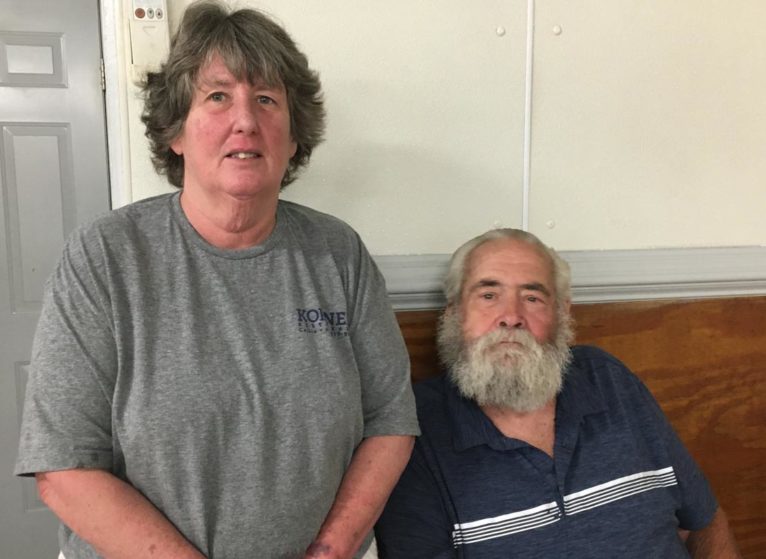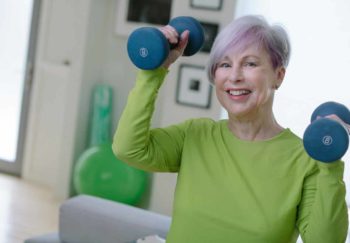When Roy Wood got up the morning he started having stroke symptoms, he could tell something was off.
“I started off here at the house. I couldn’t comb my hair with my right hand. Then I started walking over to the truck, and I dropped my walking cane twice,” says Roy.
From home, he went to the Korner Restaurant in Charlottesville. There, Roy was luckily able to get help right away. His longtime friend, Cynthia Hinkle, spotted Roy’s developing signs of stroke.
It Helps to Have Friends
Roy’s a man on the go. He shares with me how he often goes fishing with friends. He tells me a story about meeting with his buddies at one of the local lakes. It’s clear his mobility and independence are important to him.
Roy smiles often while we talk, despite the emergency he lived through. Both Charlottesville residents, Cynthia has known Roy for a long time. “Probably about 30 years,” she says.
“It makes me feel old!” Roy laughs heartily when he tells me he’s known her since her teenage years.
These days, Cynthia’s a server at the Korner Restaurant, one of Roy’s favorites. “He’s a regular,” Cynthia notes.
“I go two or three times a week, maybe,” agrees Roy. When asked why he likes going there, he responds, “Home-cooked meals.” He chuckles as he tells me he loves the breakfast there.
“I know all of them, and they all know me in there,” he says of the restaurant staff.
Spotting Roy’s Signs of Stroke Made the Difference
On the day of Roy’s stroke, it was hot. The way Roy tells it, when he got to the restaurant, he couldn’t get out of his truck right away.
“I pulled up in there, and I knew something was wrong,” he says. “But I didn’t know what. I was shaking and carrying on.”
Cynthia remembers the day clearly. “I saw him pull in. Probably about 15 minutes later, I went to take the trash out. And I saw him sitting in the handicapped parking place.” She approached Roy to check on him. When she got close, she noticed something was wrong.
“I said, ‘Roy, why are you out here? It’s hot!’ He just kind of looked at me. He said something, and I didn't understand him,” recounts Cynthia.
As she moved closer to check on him, she noticed that his lip was drooping. “I could tell he was having trouble with his arm, his hands. He couldn’t hold on to anything. But the lip gave it away.”
That’s when she went and got help. Someone called emergency services. Cynthia and her boss tended to Roy as they waited for the ambulance to arrive.
How to Recognize the Signs of Stroke
Strokes strike quickly. Getting emergency help as soon as possible is the best way to help someone survive a stroke without lasting effects.
To recognize the symptoms of stroke, remember BE FAST:
- Balance — sudden loss of balance or coordination
- Eyes — double vision or lack of vision in one eye
- Face — an uneven smile, one side of the face drooping
- Arm — one arm is weak
- Speech — slurred speech
- Time — call 911 at once
“Cynthia recognized he was having a stroke,” explains Andrew Southerland, MD, an expert at treating stroke at UVA Health. Southerland treated Roy's stroke at the UVA Health emergency department.
“Using the BE FAST acronym, in his case, it was 'Face', 'Arm', and 'Speech'. Roy had all three. BE FAST also includes folks that have balance and vision issues. The 'T' is time – getting to the hospital as soon as you can.”
Getting help right away can mean the difference between living or dying. It can also mean the difference between a full recovery and permanent disability.
Getting Roy Help
“We have a huge stroke team that responds rapidly for anybody with new signs or symptoms,” says Southerland. “He came in within an hour or so of developing rather sudden left-sided weakness and slurred speech.”
Figuring out what kind of stroke Roy had was important in deciding what treatment he got.
“Roy was having an acute ischemic stroke. Ischemic strokes are the vast majority – 80 to 85% of all the strokes we see are of that variety. Ischemic means that the brain is not getting enough blood flow and oxygen,” says Southerland. These strokes happen when a blood vessel is blocked and oxygen can’t get to the brain.
Hemorrhagic strokes are different – they happen when a blood vessel leaks blood into the brain. UVA Health is prepared to treat all kinds of strokes, no matter how complex.
From TPA to TNK: A Life-Saving Shot
Time is vital when treating a stroke. That’s why when someone has an ischemic stroke, emergency services usually give a shot called tissue plasminogen activator (TPA). It thins the blood and breaks down the clot blocking the blood vessel. Then blood and oxygen can get to the brain again.
“We explain it as, ‘You have a clogged pipe, and we give you Drano for your Braino,’" smiles Southerland. "When it works, it works well enough to restore function to a part of your brain that is in the process of dying,” he explains.
Southerland credits researchers here at UVA Health for the early studies that helped develop TPA. Additionally, they’ve developed a new version of this clot-busting medicine, called tenecteplase (TNK). TNK may be safer and more effective than TPA.
Roy was lucky enough to get this new drug. “Roy was one of the first patients that we gave TNK. We’re one of the first places in the region using this advanced clot-busting medication.”
The way Roy tells it, “They gave me a shot, and that saved me.”
SUSPECT STROKE? CALL 911 RIGHT AWAY
Knowing the signs of stroke can help save a life.
Ready for More Fishing
Today, after treatment and rehab, you’d never guess that Roy suffered a stroke. He still visits the Korner Restaurant regularly. On the day he told me his story, he was heading out to the lake at Walnut Creek to meet up with some friends. And, of course, to get some fishing in. He credits Cynthia’s quick thinking and Dr. Southerland’s work for that.
When I asked Cynthia if Roy seems different after his stroke, she says that he doesn’t.
“Roy, he wants to keep on going,” she chuckles. “I think he loves to fish so much he doesn’t want the fish to miss him!”
Southerland enjoys being able to help folks in the community.
“Both my own family and people I knew growing up, they're a lot like Roy and Cynthia.” Southerland says. “I think this case speaks to how interwoven these individual communities can be, and that the Korner Restaurant serves as a center of an important demographic that we serve.”
He and several colleagues visit the restaurant regularly.
“We have a group of folks that work in the health system that eat breakfast at the Korner Restaurant once a month. So, I’ve gotten to know Cynthia and I see Roy there. It's just a lot of good, good vibes,” smiles Southerland.


What a great story. This one happened in our community. I place a lot of people in the community know. (the Korner Restaurant). In some cases, people they know. It makes it personal. I think people pay more attention to this kind of warning. So glad Roy is doing ok. Happy Fishing Roy!!!!
Good Job looking out Cynthia. If you had not recognized the symptoms of a stroke. Roy’s story most likely would have been very different. You are a hero.